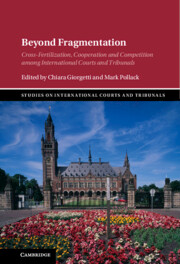 Beyond Fragmentation
Beyond Fragmentation Book contents
- Beyond Fragmentation
- Studies on International Courts and Tribunals
- Beyond Fragmentation
- Copyright page
- Dedication
- Contents
- Contributors
- Foreword
- Preface
- 1 Beyond Fragmentation
- 2 The Procedural Cross-Fertilization Pull
- 3 Procedural Convergence in International Courts and Tribunals
- 4 New Media Evidence across International Courts and Tribunals
- 5 The Acquis Judiciaire, a Tool for Harmonization in a Decentralized System of Litigation?
- 6 Why Cite External Legal Sources?
- 7 Of Gardeners and Bees
- 8 A View from the Coal Face
- 9 Agents of Cross-Fertilization
- Index
6 - Why Cite External Legal Sources?
Theory and Evidence from the European Court of Human Rights
Published online by Cambridge University Press: 28 April 2022
- Beyond Fragmentation
- Studies on International Courts and Tribunals
- Beyond Fragmentation
- Copyright page
- Dedication
- Contents
- Contributors
- Foreword
- Preface
- 1 Beyond Fragmentation
- 2 The Procedural Cross-Fertilization Pull
- 3 Procedural Convergence in International Courts and Tribunals
- 4 New Media Evidence across International Courts and Tribunals
- 5 The Acquis Judiciaire, a Tool for Harmonization in a Decentralized System of Litigation?
- 6 Why Cite External Legal Sources?
- 7 Of Gardeners and Bees
- 8 A View from the Coal Face
- 9 Agents of Cross-Fertilization
- Index
Summary
This chapter proposes a theoretical framework in which the absence or the presence of cross-fertilization depends on how a court and its judges strike the balance between the potential persuasive value of external citations and the potential concerns about deference that may arise from grounding decisions in external sources. It then tests observable implications from this theoretical perspective using a new data set of European Court of Human Rights (ECtHR) references to international court rulings and international legal materials. The findings generally support the theoretical framework. The ECtHR mentions external international law sources in 15 per cent of the judgments that engage in some form of new legal interpretation, but most of these references are to Council of Europe (CoE) documents or institutions, which are typically not controversial from a deference perspective. By contrast, the ECtHR cites international court judgments in only 3 per cent of its judgments and does so even more rarely in violation findings, which raise more deference concerns. The conclusion discusses the implications for other courts.
Keywords
- Type
- Chapter
- Information
- Beyond FragmentationCross-Fertilization, Cooperation and Competition among International Courts and Tribunals, pp. 162 - 181Publisher: Cambridge University PressPrint publication year: 2022


